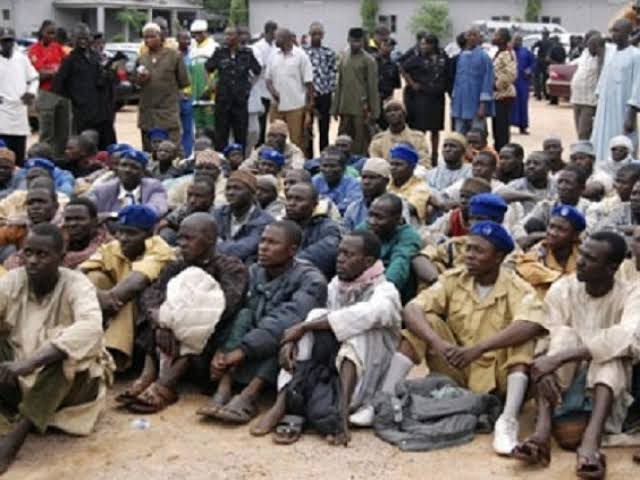686
By Tracy Moses
The Federal Government has disclosed that more than 300 repentant terrorists are currently undergoing rehabilitation as part of a wider strategy to combat terrorism through non-violent, community-based interventions.
Major-General Adamu Laka, National Coordinator of the National Counter Terrorism Centre (NCTC), made the revelation on Thursday in Abuja during a high-level stakeholders and donors’ meeting aimed at advancing livelihood and agricultural opportunities for ex-combatants and conflict-affected communities.
He said the ongoing effort is part of the government’s Operation Safe Corridor programme, designed to deradicalise, rehabilitate, and reintegrate low-risk former fighters.
“Operation SAFE CORRIDOR, located in Mallam Sidi, Gombe State, has to date rehabilitated and reintegrated over 2,600 low-risk ex-combatants,” Laka noted.
“Currently, we have more than 300 clients undergoing the programme. These are individuals who voluntarily surrendered, mainly from the North-West and North-Central regions.”
He added that the deradicalisation programme includes psychological support, vocational training, civic education, and religious counselling, all aimed at reorienting the individuals for peaceful reintegration.
“It’s not just about disarming them,” he said. “We are rearming them with tools for peace, productivity, and positive participation in society.”
Laka further explained that the government is observing a growing number of insurgents and armed bandits expressing interest in surrendering, especially in the North-West. To that end, the Centre is already working on developing similar Disarmament, Deradicalisation, and Reintegration (DDR) frameworks tailored specifically for that region.
“Our goal is to create a scalable and sustainable template that can be adapted to different zones of the country,” he said. “We must not wait for violence to escalate before deploying these interventions.”
However, Laka identified a critical gap in the rehabilitation process, the lack of post-reintegration support for former combatants.
“One of the major lessons from previous DDR programmes is the urgent need for sustainable economic reintegration,” he emphasized.
“We’ve seen that when ex-combatants are left idle or excluded economically, they become vulnerable to re-radicalisation or criminality. We must close that gap.”
To tackle this, Laka announced a new partnership between the Federal Government and the International Institute of Tropical Agriculture (IITA) under an initiative called Seeds for Hope.
“This programme is not only for repentant terrorists. It also extends to widows, orphans, and displaced persons in conflict-affected areas,” he said.
“It will provide access to land, farming inputs, training, mentorship, and crucial market linkages to ensure beneficiaries can sustain their livelihoods.”
He disclosed that six states have already expressed readiness to host the agricultural initiative and integrate it into their rural development programmes.
“What we are building is not just peace, but prosperity,” Laka concluded. “When people have hope and purpose, extremism loses its grip.”
Also speaking at the event, IITA’s Deputy Director-General, Dr. Abdoulaye Tahirau, described Seeds for Hope as a vital platform for inclusive peacebuilding and food security.
“This initiative is about more than farming,” Tahirau said. “It’s about dignity. It’s about restoring agency to individuals and rebuilding broken communities. Agriculture is a powerful tool for resilience and social healing.”
He explained that the programme will focus on climate-smart agriculture, value chain development, and youth empowerment.
“We will work closely with local governments and community leaders to ensure transparency, inclusiveness, and long-term sustainability,” he added.
Stakeholders at the event, including representatives from donor agencies, civil society organisations, and local NGOs, welcomed the initiative and pledged their support for its successful implementation.



